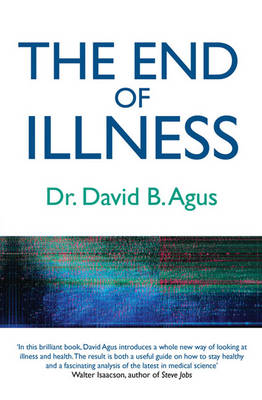
Terri M. LeBlanc
Written on Jan 3, 2014
A couple years ago, when The End of Illness was released, I saw Dr. Agus on The Daily Show with Jon Stewart. He seemed like a pretty easy going guy, and easy to understand despite being a doctor. Plus the topic about how to end illness is quite fascinating. I added The End of Illness to my to-read list. After receiving my holiday boon of book store gift cards, I found a copy of The End of Illness on clearance at the local Barnes and Noble.
The End of Illness is a fairly accessible book about some of the progresses that have been made in medical research that might be used to create a more personalized form of healthcare. The approach focuses on the individual by studying the proteins in the blood to determine what is causing the illness and then determining how to treat the individual. For example, by studying the proteins in blood, doctors and scientists could determine why some drugs work for certain individuals and not for others. Nova recently covered this in relation to the treatment of mental disorders.
While the books offers some hope for better treatment of terminal illnesses like cancer, there isn't any immediate change in sight. This book was published in 2011 and I know that some cancer drugs haven't changed in 20+ years. The changes Agus proposes would require the system to change to dramatically and actually force for of dialogue between doctors and patients. With the current way the system works, spending more time with patients and doesn't seem to be at the top of anyone's priority list.
I only only two negatives to mention about the book. One. The dust jacket flap was a bit misleading thinking the Agus was going to provide some great revelation about preventing illness that hadn't yet considered, but it was pretty basic common sense advice. Eat right. Get at least 8 hours of sleep. Monitor your health in a diary daily so when you have a yearly physical you can give your physician an accurate picture of the state of your health. Two. In Chapter 5, Agus talks about the research currently being done on blood proteins and how that can be used for diagnosis and monitoring of a person's health. There is an image shown on page 110. Agus tries to explain how complicated the proteins in the blood are and then shares the picture. It's in black and white. I can't help, but wonder how much more powerful this explanation would have been if the picture had been in color*.
Overall, I liked The End of Illness. It offers some hope in a new way to treat illness and while this may be a long way off, there are researchers out there working towards this change. If you are reading this book looking for some groundbreaking way to stave off illness in your own life, you will be sorely disappointed. If you are fascinated by the science and history of the treatment of illness, you may like this book. The End of Illness by David B. Agus, M.D. gets a thumbs up.
